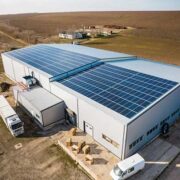- The Climate Pledge is a commitment co-founded by Amazon and Global Optimism.
- It calls on signatories to take urgent action to meet the Paris Agreement 10 years early.
- Signatories are implementing real, science-based, high-impact changes to their businesses, including deploying renewable energy.
Seattle — Amazon and Global Optimism announced that Best Buy, McKinstry, Real Betis, Schneider Electric, and Siemens have joined The Climate Pledge, a commitment to be net-zero carbon by 2040—a decade ahead of the Paris Accord’s goal of 2050.
These new signatories to The Climate Pledge agree to:
1. Measure and report greenhouse gas emissions on a regular basis;
2. Implement decarbonization strategies in line with the Paris Agreement through real business changes and innovations, including efficiency improvements, renewable energy, materials reductions, and other carbon emission elimination strategies;
3. Neutralize any remaining emissions with additional, quantifiable, real, permanent, and socially-beneficial offsets to achieve net-zero annual carbon emissions by 2040.
“From hurricanes to forest fires, climate change is leading to very real, negative impacts to our daily lives even sooner than scientists expected. Every company has a role to play in fighting climate change, and we welcome these new Climate Pledge signatories who are stepping up and committing to reach net-zero carbon by 2040,” said Jeff Bezos, Amazon founder and CEO. “They are showing important leadership in accelerating the transition to a low carbon economy to protect the planet for future generations.”
To achieve a net-zero carbon footprint, Best Buy will continue to measure, manage, and decarbonize its emissions, increase the energy efficiency of its operations, and invest in carbon offsetting projects.
Since 2009, the company has reduced its carbon emissions by 56% through investments in LED lighting, controls systems and hybrid vehicles. The company has also undertaken investments in utility-scale solar generation like the Best Buy Solar Field, which powers the equivalent of 260 Best Buy stores each year.
Through its previously established science-based target, the company aims to reduce emissions in its operations by 75% and help customers reduce product emissions by 20%, saving the company $5 billion on utility costs by 2030. And as it looks to the future and meeting the 2040 requirements of The Climate Pledge, Best Buy’s focus areas may include fleet electrification, energy efficiency, renewable energy investments, and the development of carbon offset projects.











Comments